UCLA Law students advocate for equitable groundwater rules at the State Capitol
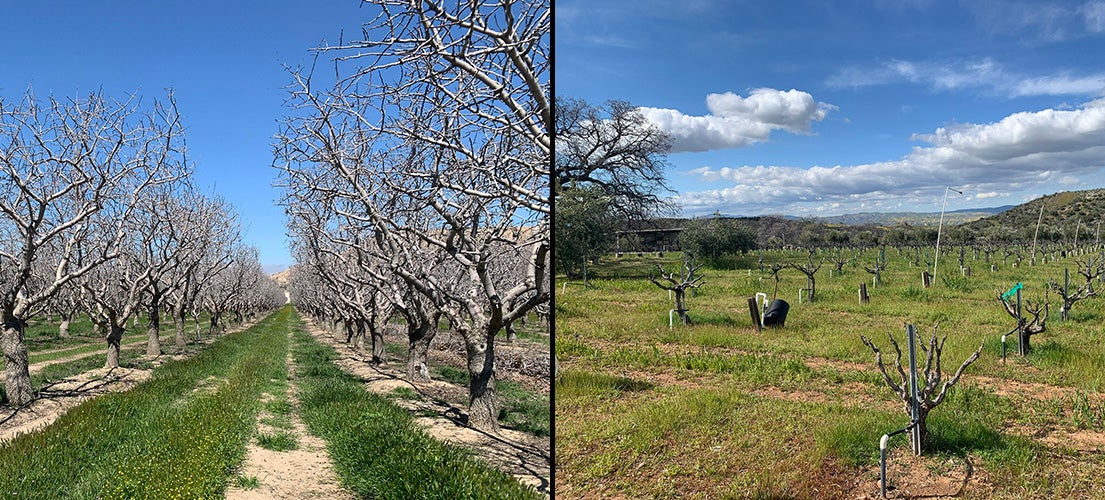
“Welcome to Sacramento, California” reads the sign that greets Adrianne Davies, Owen McAleer and Gabi Rosenfeld as they step off the airplane. They’ve flown in to provide witness testimony to a State Assembly committee that is considering reforms to California’s groundwater rules. But these three are not representatives of a state agency or local irrigation district. They are second-year students at the UCLA School of Law. And they helped write the bill in question, AB 779.
The trio has about 24 hours to refine their testimony, anticipate questions from the committee members and polish their answers.
“I think all three of us have developed a passion for the bill and really want it to make it through the Legislature,” says Davies, who describes feeling nervous but excited. “We’ve been working on the project since last September and went through multiple rounds of research memos and countless stakeholder interviews to develop the final bill proposal.”
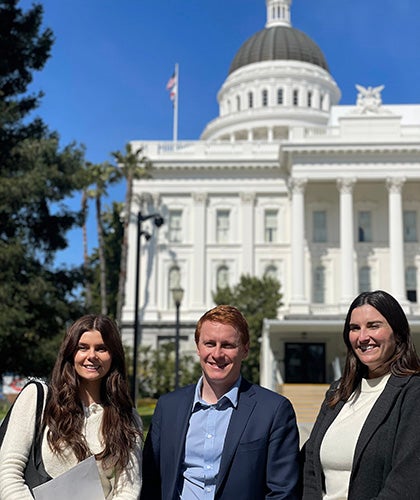
Their journey started last fall, when Davies, McAleer and Rosenfeld participated in the California Environmental Legislation and Policy Clinic, a hands-on program that gives students a chance to work directly with California legislators to make law. The clinic is taught by faculty and staff of the Emmett Institute on Climate Change and the Environment, which is the center of all things environmental at UCLA Law. In past years, clinic students helped write a bill to make working conditions safer for agriculture workers who labor outdoors in the heat, and provided research support for a law that cracks down on single-use plastics that damage the environment.
It was in this legal clinic that Davies, McAleer and Rosenfeld learned firsthand about California’s complex groundwater adjudication process, which can determine how water rights are allocated in a particular basin. It would lead them down the road to writing new legislation.
“Major equity and fairness concerns”
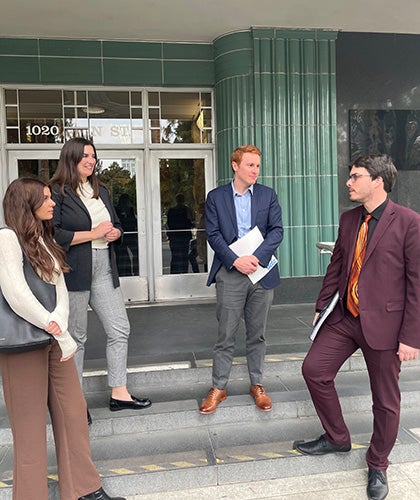
In most parts of the country, the process for managing groundwater rights was established many decades ago. In California, the process wasn’t formalized until 2014, when lawmakers passed the Sustainable Groundwater Management Act, or SGMA. That package of bills sought to tame the wild west of California water use and put a stop to rampant agricultural pumping that was drying up wells during a historic drought. SGMA created a statewide framework for groundwater management decisions to be made at the local level through local “groundwater sustainability agencies.”
But SGMA’s passage didn’t actually determine groundwater rights for California’s many users. Those formal determinations will happen through the adjudication process, and could take decades, notes Rosenfeld. “Unlike other states, the water rights in California had never been formally figured out,” she says. The 2L student from Los Angeles, grew up hearing about her grandfather’s own environmental activism, fighting off developers in Laguna Beach during the 1970s to preserve open space, and decided to study environmental law at UCLA. “In California, every basin is going to have to go through adjudication, so this process is going to affect everybody at some point.”
And this process has lots of kinks to work out, according to Assemblymember Lori D. Wilson, who represents the 11th assembly district covering parts of Contra Costa and Solano counties. Wilson’s office explained that California’s existing groundwater management laws had created resource and transparency challenges for small farmers in her district and beyond, and encouraged the students to help improve the process.
Since September, the three have worked closely with Wilson’s legislative director, Mark Rossow, to engage stakeholders like the Community Alliance with Family Farmers, which advocates for sustainable farming policies. Members of that alliance say the adjudication process can be lengthy, expensive, and opaque—all factors that exacerbate the underrepresentation of disadvantaged communities in the process.
McAleer, who came to UCLA after spending time at an environmental nonprofit, says he and his fellow students came to view the fight over water rights through an equity lens. “Environmental justice is both indispensable and should be part of every project or policy proposal. We are very lucky that our project combines major equity and fairness concerns with technical, cutting-edge water policy.”
The resulting bill, AB 779, seeks to amend the adjudication process in three ways: inform the public about adjudication proceedings; clear a path for expert agencies to provide science-based testimony; and ensure groundwater is sustainably managed while rights are adjudicated.
Davies, who hails from the rural town of Murphys in the foothills of the Sierra Nevada (population 2,213), says small farmers need more help. To avoid compliance with the new law of the land (SGMA), many larger agricultural operations turn to the adjudication process to buy time and keep pumping, she explained. She pointed to one adjudication in the Antelope Valley Groundwater Basin that lasted over 15 years, involved 75,000 parties and 9,000 docket entries, and employed over a hundred lawyers.
“So naturally that means that the small farmers within these basins would become a part of that adjudication process and then it becomes a battle over who has the means to comply with that process and understand it,” Davies says. “That was what really led us to focus on it.”
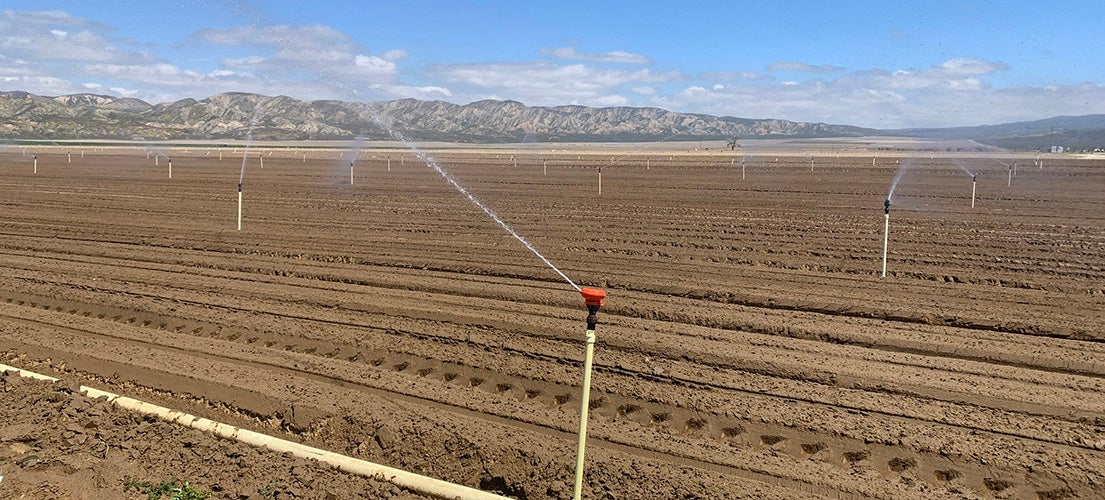
The Cuyama Valley: a microcosm of what’s at stake in California
Drive two hours north of Los Angeles to the Cuyama Valley and you’ll find an example of the power dynamics at play in the adjudication process.
With the Carrizo Plain National Monument to the north and the Los Padres National Forest to the south, the Cuyama Basin currently boasts about 16,000 acres of irrigated acres of crops, which are groundwater dependent. More water is being pumped from the ground than is replenished, making the Cuyama Valley one of 21 “critically overdrafted” basins where water rights are fiercely contested.
Highway 166 is surrounded by citrus orchards, grazing cattle and lots and lots of carrot fields. Grimmway Farms and Bolthouse Farms operate here and together they produce some 80 percent of the country’s fresh carrots. The companies – both owned by private equity firms – filed an adjudication lawsuit over the Cuyama Valley Groundwater Basin in August 2021, asking for a judicial determination of groundwater rights for every landowner. That has Cuyama’s small and mid-sized local farmers feeling squeezed.
“The Cuyama Valley is one of the first identified critically overdrafted basins with a Groundwater Sustainability Plan (GSP) to also be faced with adjudication,” says Robbie Jaffe. She’s co-owner of Condor’s Hope, a small vineyard that uses dry-farm practices to produce olives and grapes, and a community advocate for small farmers in the area. “The two largest pumpers have filed suit against every landholder in the Valley to try to capture a greater allocation of water,” Jaffe says.
When it comes to the adjudication process, Jaffe says the immediate challenge for small farmers and domestic users is simply to keep their water rights. “We all have to retain lawyers. This includes the small community water distributor in New Cuyama as well as the rural school district. None of us can afford this. Folks can't afford to stay in the fight.”
Condor’s Hope is nestled in rolling hills. A small ranch house overlooks the olive trees and neatly pruned vines of five grape varietals. The property is powered with solar panels and uses passive solar heated water. A backup irrigation system is fed by a small well that is pumped using solar power. The five-acre vineyard produces under 500 cases of wine per year.
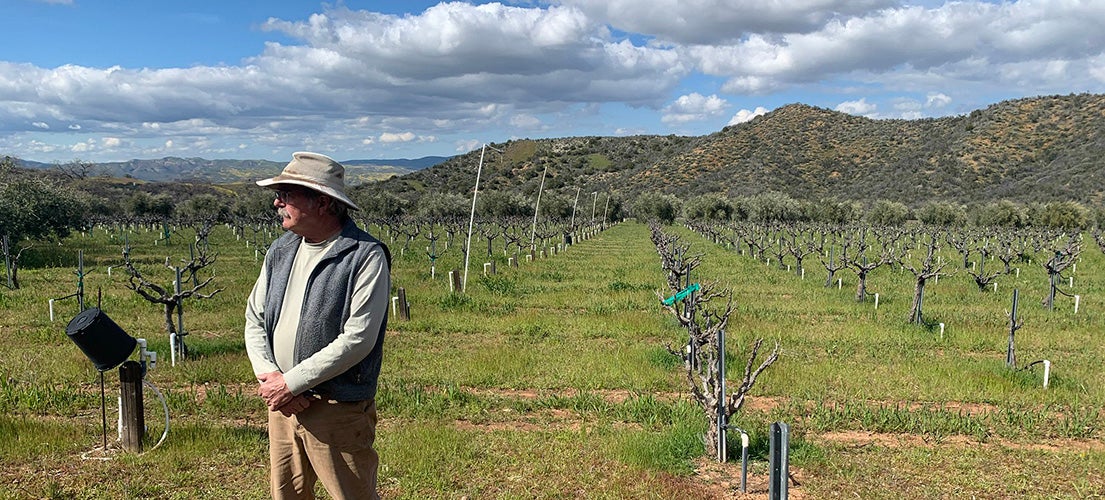
Compare that to their neighbor in the region: a vineyard owned by Harvard University’s endowment. In 2012, a subsidiary of Harvard University’s investment company bought the North Fork Ranch in the Cuyama Valley, featuring 840 acres of vineyards. They reportedly drilled 16 wells to irrigate the vineyard, the largest in the valley. For the last few years, the investment company has been seeking to build three huge water reservoirs to provide frost protection to the vineyard. Neighbors like Jaffe have opposed the project at every step. The Santa Barbara County Planning Commission recently voted to postpone a vote on the reservoir project until May 10, hinting that it could deny the project altogether. But even a denial wouldn’t be the end since the subsidiary could file an appeal.
Meanwhile, the California Department of Water Resources announced in early March that it was recommending approval of the groundwater sustainability plans submitted by 12 of the critically overdrafted water basins. That includes Cuyama Valley’s plan. Jaffe says it’s hard to know what it all means for water uses like them because of the adjudication happening on a “parallel track.” Small family farmers need more support and resources to navigate these processes, Jaffe says. “We are a microcosm of what is happening in California water.”
Back in Sacramento: Testimony and a decision
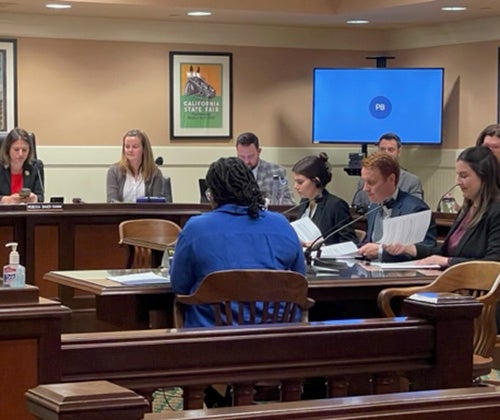
The night before, the three students staged a legislative cram session with their faculty advisors Beth Kent and Julia Stein, who came with them to Sacramento. Weeks before, they had read the support and opposition letters for AB 779. They communicated closely with Assemblymember Wilson’s office to make sure they were preparing to answer questions in ways that lined up with her vision of the bill. And a week before the hearing, the three held a mock hearing in the UCLA moot courtroom where law fellows from the UCLA Emmett Institute helped by roleplaying as assemblymembers. The goal: get comfortable defending the bill while thinking on their feet.
Assemblymember Wilson steps up to the hearing room table first and introduces the bill in broad sweeps. "I have some really cool witnesses here today,” she tells the committee members as McAleer, Davies and Rosenfeld step up to the table.
Rosenfeld starts by laying out the need for reform. “Proceedings can take over ten years with legal fees in the millions of dollars,” she tells the assemblymembers. “In some cases, small farmers have been forced to sell their operations because of the financial strain of the process.” She notes that these problems are especially prevalent for small farmers and farmers of color.
To address that, the bill would require parties in adjudications to forward pleading and briefing materials to the Department of Water Resources (DWR). DWR would then be required to publish the materials on a publicly available website. Local groundwater sustainable agencies, or GSAs, would also be required to hold public meetings explaining the adjudication process to community members and groundwater users in their basin.
Next up, McAleer explains why this increased participation by state agencies would improve the process. “AB 779 would speed up the proceeding, reduce administrative burden, and allow the courts to get the clearest and most current picture of the situation in the basin, even when not every groundwater user can be party to the adjudication,” he says. The bill would also require parties to report monitoring data to the adjudicating court to prevent over-pumping during the adjudication proceeding. Davies tells the committee that any stakeholders that worry these new requirements could be hard to meet should keep engaging with the bill’s authors. “We are committed to making AB 779 a bill that lessens the burden and improves the process for all parties involved.”
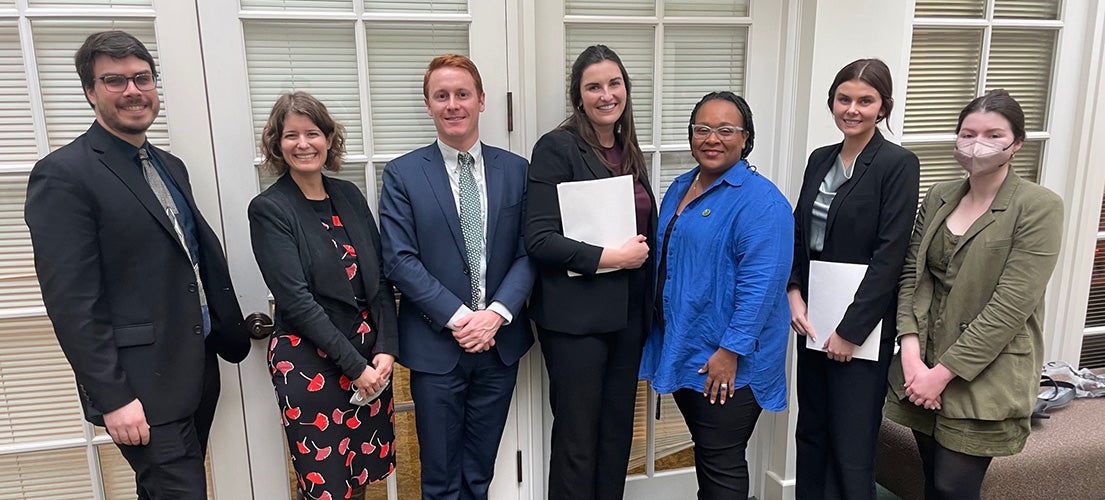
Before the committee takes a vote, several members share observations, including Assemblymember Akilah Weber, who represents parts of San Diego. “I really appreciate that you specifically focused on the fact that the court should need to take into account the needs of small farms and disadvantaged communities in your bill. I think that’s so very important.”
When they vote, the bill passes out of committee. Smiling, the students and faculty advisors gather outside the hearing room to chat, share notes and pose for a few pictures. It’s nowhere near the end of the road for their bill—it moves to the Appropriations Committee before it heads to a vote on the Assembly floor—but it feels good to clear one big hurdle, Davies says. “As students, the opportunity to advocate and be heard by the committee is deeply meaningful for all of us and made us all feel like we had come full circle on getting the project before the committee.”